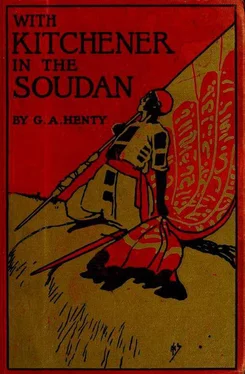For the moment it seemed as if the surging crowd streaming down must carry all before it, but the steadiness with which the 9th Soudanese moved into their place on the flank of the line, and the other regiments remained as if on parade, soon reassured him. The terrible slaughter that was taking place in the ranks of the Dervishes soon showed that in that quarter at least there was no fear of things going wrong, but he could not but look anxiously towards the great mass of men approaching from the north. It was a matter of minutes. Would the present attack be repulsed in time for the position to be changed to meet the coming storm? Occasionally Grego^ looked back to see if reinforcements were coming. Wauchope's brigade was visible over the tops of the scattered bushes. The movements of the line showed that they were coming on at the double, but they were farther away than Ed Din's host, and the latter were running like deer.
He felt a deep sense of relief when the 9th Soudanese were thrown back, performing the movement as quietly and steadily as if on a di^ill-ground, and two batteries of artillery galloped across to their support. He had hardly expected such calm courage from the black battalion. As to the bravery of the Soudanese troops there was no question. They were of the same blood and race as their foes, and had shown how bravely they could fight in many a previous battle, but he was not prepared for the steady way in which they worked under such novel circumstances; and although they too must have known that every moment was of consequence, they moved without haste or hurry into the new position, scarcely glancing at the torrent which was rushing on towards them.
Not less steadily and quietly did the 11th, considered to be the crack regiment of the brigade, swing round, and as calmly and firmly did the Egyptian battalion — composed of the peasants who, but twenty years before, had been considered among the most cowardly of people, a host of whom would have fled before a dozen of the dreaded Dervishes—march into the gap between the two black regiments and manfully hold their own. And yet he could not but feel sorry for the valiant savages who under so awful a fire still pressed forward to certain death, their numbers withering away at every step until they dwindled to nothing, only to be replaced by a fresh band, which darted forward to meet a similar fate; and yet, when he remembered the wholesale slaughter at Metemmeh, the annihilation of countless villages and of their inhabitants, and, above all, the absolute destruction of the army of Hicks Pasha, the capture of Khartoum, the murder of Gordon, and the reduction to a state of slavery of all the peaceful tribes of the Soudan, he could not but feel that the annihilation of these human tigers and the wiping out of their false creed was a necessity.
When the last shot was fired he dismounted and leant against his horse, completely unnerved by the tremendous excitement that had been compressed into the space of half an hour. Zaki was in ecstasy at the victory. The ruthless massacre of so many of his tribesmen, the ruin of his native village, and the murder of his relations was avenged at last. The reign of the Dervishes was over; henceforth men could till their fields in peace. It was possible that even yet he might find his mother and sisters still alive in the city but a few miles away, living in wretched existence as slaves of their captors. Tears of joy streamed down his cheeks. He would have liked to help to revenge the wrongs of his tribe, but his master needed him: and moreover, there was no place for an untrained man in the ranks of the Soudanese regiments. They were doing their work better than he could. Still, it was the one bitter drop in his intense joy that he had not been able to aid in the conflict. He expressed this to Gregory. " You have had your share in the fight, Zaki, just as I have had. I have not fired a shot, but I have been in the battle, and run its risks, and so have you. Each of us has done his duty, and we can say for the rest of our lives that we have borne our share in the great battle that has smashed up the power of the Khalifa and the rule of the Dervishes."
CHAPTER XV
KHARTOUM
THERE was no pause or rest for the troops who had been fighting for so many hours in the heat of the African sun. It was all-important to occupy Omdurman before the remnants of the Khalifa's army reached it, and as it was known that the Khalifa himself had returned there, it was hoped that he might be captured. It was ten o'clock when Macdonald's brigade fired their last shot. In half an hour the troops went forward again.
The field presented a terrible appearance, being thickly dotted
with dead, from the Surgham Hill across the plain and round by the Kerreri Hills to the spot where Macdonald's brigade had made their stand. There were comparatively few wounded, for, wiry and hardy as they were, the wounded Dervishes, unless mortally hit, were for the most part able to crawl or walk away, which they had done unmolested, for on each occasion after the bugle sounded cease firing not a shot was fired at them. But of dead there were fully ten thousand scattered more or less thickly over the plain.
From the position in which they were placed, the Egyptian troops as they marched south passed the spot where the Khalifa's flag was still flying as it had been left after its last defenders had fallen. Slatin, who was with the army, rode over the plain at the Sirdar's request to ascertain if any of the Dervish leaders were among the fallen. He recognized many, but the Khalifa, his son Ed Din, and Osman Digna were not among them. The last-named had ever been chary of exposing himself, and had probably, as was his custom, viewed the battle from a safe distance. But round the flag were the Khalifa's brother Yacoub and ten or twelve of the leading emirs.
On our side the loss had been comparatively slight. Our total number of casualties, including the wounded, was five hundred and twenty-four, towards which Macdonald's brigade contributed one hundred and twenty-eight. Marching steadily on, the force halted in the outlying suburb of Omdurman at mid-day to obtain much-needed food and water. As soon as the cavalry had watered their horses they were sent round to the south of the town to cut off fugitives, and some of the gun-boats moved up to their support. Deputations of the townsfolk, Greeks and natives, came out and offered to surrender. They said that the Khalifa was in his house, and that he had about a thousand of his body-guard with him, but that they could not offer any successful resistance. The town was full of fugitive Dervishes; many thousands of them were there—among them a great number of wounded.
At half-past four the Sirdar with his staff entered the town accompanied by Maxwell's Egyptian brigade. Only a few shots were fired; the Dervish courage was broken. It was to the followers of the Prophet, and not to the infidels, that the plains of Kerreri had proved fatal. It was their bodies and not those of the white soldiers that were strewn there so thickly. The promise of the Khalifa had been falsified, the tomb of the Mahdi was crumbling into ruins, the bravest of their troops had fallen—what more was there to be done ? As Slatin Pasha rode in at the head of the troops he was instantly recognized by the people, among whom for years he had been a prisoner; and on his assurances that mercy would be shown to all if there was no resistance, numbers of the Dervishes came out from their houses and huts and laid down their arms. The women flocked out into the streets, uttering their long and quavering cries of welcome. To them the entry of the British was a relief from a living death, as almost all were captives taken in war or in the Dervish raids upon quiet villages. They could scarce even yet believe that they were free—that their tyrants were slain or fugitives. Intense was the surprise and relief of the population when they were told that there would be no looting—no harm done to any by the conquerors; that all would be free, if they chose, to depart to their homes, and to take their few belongings with them.
Читать дальше












